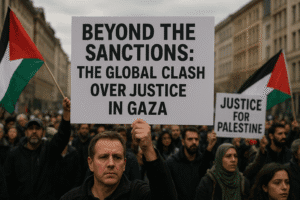Beyond the Sanctions: The Global Clash Over Justice in Gaza
The United States has imposed sanctions on three longstanding Palestinian human rights organizations for petitioning the International Criminal Court to investigate alleged Israeli war crimes in Gaza. This move effectively uses financial pressure to punish groups for seeking legal accountability through an international institution. The action continues a precedent set by the Trump administration, which similarly sanctioned ICC officials over an Afghanistan war crimes inquiry.
It highlights a stark conflict between power politics and international law, pitting national sovereignty against universal jurisdiction. The sanctions arrive amid a declaration from a leading body of genocide scholars that Israel’s actions in Gaza meet the legal criteria for genocide. Consequently, the U.S. stance creates a profound paradox: championing a rules-based order while penalizing those who use its legal mechanisms. Ultimately, this confrontation forces a global examination of who can access justice and who is shielded from it.

Beyond the Sanctions: The Global Clash Over Justice in Gaza
In a move that underscores the deepening geopolitical fissures around the Israel-Gaza war, the United States has levied sanctions against three prominent Palestinian human rights organizations. Their crime, in the eyes of the U.S. Treasury, was not violence or funding terrorism, but formally requesting the International Criminal Court (ICC) to investigate allegations of Israeli war crimes, including genocide.
This decision is more than a policy shift; it’s a stark illustration of the battle being waged not just on the ground in Gaza, but in the courtrooms and diplomatic chambers where the rules of international law itself are being contested.
The Groups in the Crosshairs
The sanctioned groups—Gaza-based Palestinian Centre for Human Rights and Al Mezan Center for Human Rights, along with Al-Haq based in Ramallah—are not fringe entities. For decades, they have been documented pillars of Palestinian civil society, their work often cited by major international bodies like the United Nations. Their mandate has traditionally involved meticulous documentation of human rights violations by all parties, including Israeli forces and Palestinian factions.
Their petition to the ICC in November 2023 focused on specific military tactics: airstrikes in densely populated areas, the imposition of a full siege, and the mass displacement of civilians. A year later, the ICC’s chief prosecutor found their claims, and others, substantial enough to issue arrest warrants for Israeli Prime Minister Benjamin Netanyahu and Defense Minister Yoav Gallant, alongside Hamas leaders, for alleged war crimes and crimes against humanity.
A Pattern of Pressure, Not an Isolated Event
The U.S. sanctions are a dramatic escalation of a long-standing American posture toward the ICC. This is not the first time the court has been threatened for pursuing cases against allies of powerful nations.
- The Trump Administration previously sanctioned ICC officials over the Afghanistan investigation, which sought to examine alleged crimes by U.S. troops and the CIA. This latest action applies the same legal framework—originally designed to protect Americans—to Palestinian NGOs.
- The underlying tension is a fundamental rejection of the ICC’s jurisdiction by the U.S., Israel, China, and Russia. These nations argue the court infringes on their national sovereignty and is susceptible to politicization.
The U.S. stance presents a difficult paradox: how can a nation that often champions a “rules-based international order” actively sanction civilian groups for using a legal mechanism within that very order?
The Scholars Weigh In: The “G” Word
Timing is critical. These sanctions arrived just days after the world’s largest association of genocide scholars, the International Network of Genocide Scholars (INoGS), passed a resolution stating that the “legal criteria for genocide have been met” in Gaza.
This is a significant development. These are not politicians or activists, but academics whose life’s work is defining and understanding mass atrocity. Their conclusion, based on Israel’s actions and the statements of some officials, places them in direct opposition to the Israeli government, which called the announcement “disgraceful” and based on a “campaign of lies.”
This clash creates a powerful dissonance for the global public: on one side, a government using economic sanctions to punish legal requests, and on the other, a body of experts using their authority to validate the core of those very requests.
The Human Cost: The Context Behind the Legal Fight
Beyond the legal and political wrangling lies the stark reality that prompted it. The war, triggered by Hamas’s devastating attack on October 7, 2023, which killed 1,200 people and saw 250 taken hostage, has exacted a horrific toll.
The numbers—over 63,000 killed, a population repeatedly displaced, and a man-made famine—are not just statistics. They are the reason these Palestinian groups went to the ICC. They represent the overwhelming human suffering that these organizations, by their very mission, are compelled to document and seek justice for.
The Uncomfortable Question for the World
The U.S. sanctions against these NGOs force a difficult but essential question: In the modern international system, who gets to define justice?
Is it the most powerful nations, who can use economic might to shield allies from legal scrutiny? Or is it the independent, albeit imperfect, international institutions created to hold all parties accountable to a common standard of law, regardless of their power?
By sanctioning groups for seeking a legal investigation, the U.S. is not merely taking Israel’s side in a conflict. It is taking a side in a much larger debate about whether the principles of international justice are universal or conditional. For readers watching this unfold, the value lies not in choosing a side, but in understanding the profound implications of this clash for accountability, human rights, and the very meaning of global justice in the 21st century.
You must be logged in to post a comment.